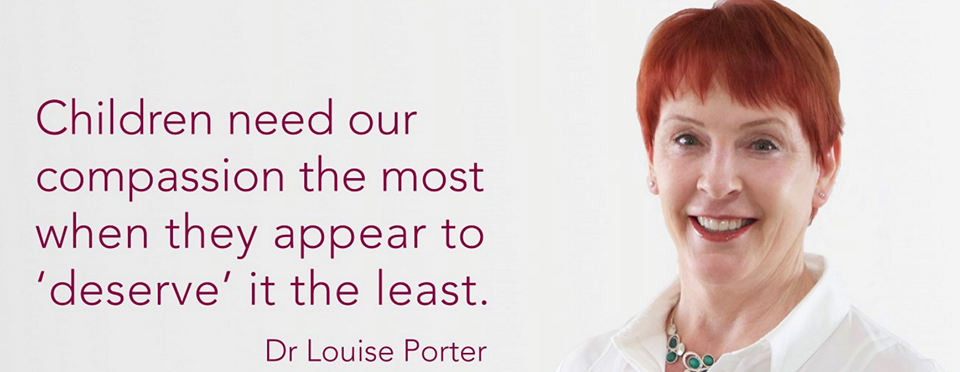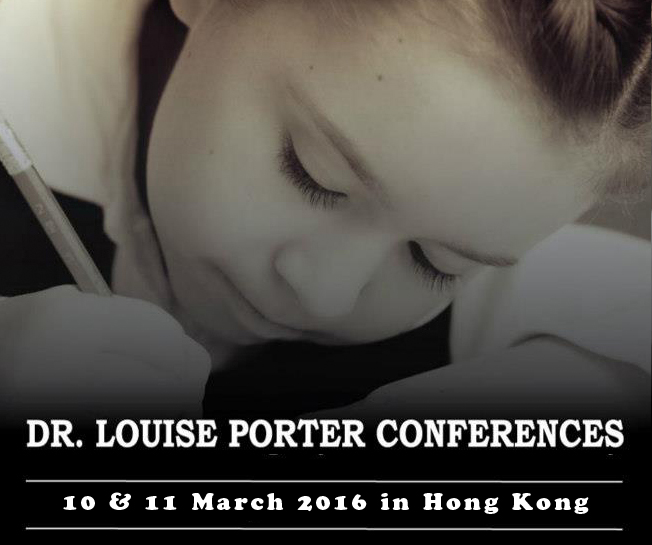Dr Porter returns with seminars for parents and practitioners in Hong Kong interested in children‘s developmental and social or emotional challenges. In her Thursday seminar, Emotional Intelligence at School and at Home, Dr Porter talks about understanding fake feelings that are thoughts (or stories in our heads) in order to be less distressed and therefore more able to process information clearly and less likely to blame others and expect them to fix what we are feeling. On the following day in Behaviour Management at Home and at School, she talks about how praise and other rewards regarding children’s achievements do not teach children to like learning, but to like rewards. Instead, guidance aims to maintain children’s intrinsic motivation to gain skills that will empower them both personally and as learners.
DATE : Thursday & Friday 10 & 11 March 2016
TIME : 6:30- 9:30 pm
PLACE: Chinese International School (map)
ADDRESS: 1 Hau Yuen Path, Braemar Hill, Hong Kong
PRICE: Thursday HK$480 | Friday HK$432
BOOKING : Online registration
ORGANIZER : Margaret Yeung
ENQUIRIES : info@ekalli.com
Emotional Intelligence at School and at Home
Thursday 10 March 2016 (6:30- 9:30 pm)
Our emotions guide us to face challenges and tasks that are too important to leave to the intellect alone. Emotional intelligence, then, is the ability to integrate thinking and emotions to produce effective behaviours.
To do this, we need to understand our emotions. However, we can become muddled if we mistake thoughts for feelings. When we allow our feelings to dictate how we live our life, we are like a puppet on a string, being jerked around by our emotions.
Therefore, it is important that, just as we call a spade a spade, we call a thought a thought and an emotion an emotion. To that end, this session will describe three fake feelings. These are merely thoughts that we have chosen to invite in and entertain – but when we give them the status of emotions, we believe that we are justified to act on them and to make other people suffer for causing them. Once we understand that they are mere thoughts (or stories in our heads), we will be less distressed and therefore more able to process information clearly and less likely to blame others and expect them to fix what we are feeling. We will be emotionally literate.
Behaviour Management at Home and at School
Friday 11 March 2016 (6:30- 9:30 pm)
In this seminar, Dr Louise Porter will compare and contrast two styles of discipline that are available to teachers: controlling discipline (which uses rewards to get children to do more of what we like and punishments to get them to do less of something we do not like) and the guidance approach, which teaches children the skills they need for considerate behaviour. With respect to children’s achievements, praise and the other rewards do not teach children to like learning, but to like rewards. Instead, guidance aims to maintain children’s intrinsic motivation to gain skills that will empower them both personally and as learners.
In terms of responding to disruptive behaviour, guidance believes that children do well when they can. Like us, children want to be successful. Therefore, if they are making mistakes, it is not because they lack incentives to behave better, but because they lack skill, the main one of which is the ability to regulate their feelings and impulses. In this session, we will examine how teachers can support students to regain command of themselves so that they can re-engage in learning and resume acting considerately.
This session is based on Dr Porter’s book, A comprehensive guide to classroom management (2015). See www.louiseporter.com.au

Dr Louise Porter
PhD, MA(Hons), MGiftedEd, DipEd, BA, BIntStuds
Dr Louise Porter is a child psychologist with over 40 years’ experience in private practice in Australia and in Asia, consulting with parents and practitioners about children‘s developmental and social or emotional challenges. She worked for ten years in disability and mainstream settings and lectured at university in South Australia for 13 years in early childhood, special and gifted education, and behaviour management.
Patron of the Hong Kong Gifted Children’s Association, she is a sought-after speaker nationally and internationally and has published widely, with her books including: Young children’s behaviour, student behaviour, gifted young children, teacher-parent collaboration and a parenting course: A Guidance Approach to Discipline.

